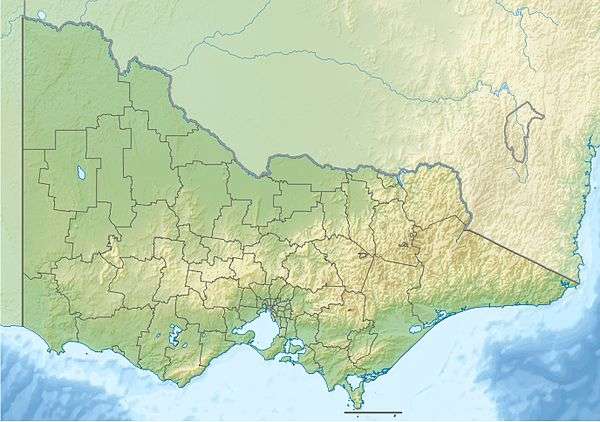Hattah-Kulkyne and Murray-Kulkyne Biosphere Reserve
| Hattah-Kulkyne and Murray-Kulkyne Biosphere Reserve Victoria | |
|---|---|
|
Hattah-Kulkyne and Murray-Kulkyne Biosphere Reserve | |
 Hattah-Kulkyne and Murray-Kulkyne Biosphere Reserve | |
| Nearest town or city | Mildura |
| Coordinates | 34°21′5.2″S 142°19′48″E / 34.351444°S 142.33000°ECoordinates: 34°21′5.2″S 142°19′48″E / 34.351444°S 142.33000°E |
| Established | 1981[1] |
| Area | 515.00 km2 (198.8 sq mi)[2] |
| Visitation | 99,000 (annual estimate) (in 2016)[2] |
| Managing authorities | Parks Victoria[2] |
| Footnotes | Coordinates[2] |
Hattah-Kulkyne and Murray-Kulkyne Biosphere Reserve is a biosphere reserve in the Australian state of Victoria located to the southern bank of the Murray River to the south-east of the city of Mildura on land occupied by the following protected areas - the Hattah-Kulkyne National Park and the Murray-Kulkyne Park.[3][4][5]
The biosphere reserve was described by UNESCO in 2016 as:[2]
The Hattah-Kulkyne and Murray-Kulkyne Biosphere Reserve is located in Southeast Australia. It comprises three main habitats: riveraise woodlands, savanna woodlands and saline shrublands. The Murray River flows through the reserve and is connected to several wetlands. However, due to the semi-arid climate it only fills intermittently with water. The main land formations are saline flats that contain shallow soils overlying gypsum, dune fields that contain relics of Pleistocence sand ridges, and floodplains that are formed of a quarterly alluvium.
The biosphere reserve was established in 1981 and is managed by Parks Victoria.[1][2]
See also
References
- 1 2 "Biosphere Reserves". Government of Victoria. August 2014. Retrieved 6 November 2016.
- 1 2 3 4 5 6 "Hattah-Kulkyne and Murray-Kulkyne". Man and the Biosphere Programme. UNESCO. Retrieved 6 November 2016.
- ↑ "Hattah - Kulkyne National Park". Parks Victoria. Retrieved 5 November 2016.
- ↑ "Murray - Kulkyne Park". Parks Victoria. Retrieved 6 November 2016.
- ↑ "Australian Biosphere Reserves". Australian Government, Department of Environment. August 2014. Retrieved 5 November 2016.
External links
This article is issued from Wikipedia - version of the 11/6/2016. The text is available under the Creative Commons Attribution/Share Alike but additional terms may apply for the media files.